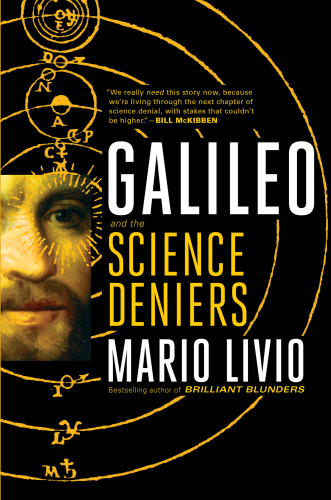
Galileo
And the Science Deniers
- اطلاعات
- نقد و بررسی
- دیدگاه کاربران
نقد و بررسی

December 23, 2019
Astrophysicist Livio (Brilliant Blunders) explores the life of Renaissance scientist Galileo Galilei, and the grim fate he met at the hands of the Catholic Church, in this entertaining biography. Born in Pisa in 1564, Galileo took to mathematics early on. Livio describes how Galileo’s educated, if poor, parents hoped he would become a doctor. Instead Galileo became an underpaid math professor at the University of Pisa and began the experiments that would make him famous. Livio vividly recounts Galileo’s efforts to support his family and explore astronomer Copernicus’s claims that the Earth went around the sun, instead of the reverse. With telescopes of his own making, Galileo revealed a universe of imperfections, which did not conform to accepted Aristotelian logic and made the Church’s Jesuit scholars uncomfortable. Accused of holding theories “false and contrary to the divine and Holy Scripture,” Galileo was condemned for heresy and forced to disavow his findings, spending his last years under house arrest. In a coda, Livio illuminates the parallels between the deniers of Galileo’s scientific findings and those today who ignore the evidence of climate change. Intriguing and accessible, and packed with clever insights, Livio’s latest gives readers plenty of think about.

February 15, 2020
A fresh biography of Galileo (1564-1642). Books on Galileo are not scarce, but the latest from astrophysicist Livio features the author's unique insights as well as his concern about the current fashion for giving ideology priority over truth. Livio rocks no boats by describing Galileo as history's first scientist. The Greeks believed that understanding the universe required thinking; they despised research because human senses are imperfect. In contrast, Galileo wondered about natural phenomenon, observed carefully, performed experiments (in a time before thermometers, stopwatches, and even minute hands), meticulously recorded the results, and--most importantly--publicized them widely in lectures, letters, and books. For 40 years, he was the most famous scientist in Europe, a position he maintained even after his disastrous conflict with the church, after which he spent his final decade under house arrest. Most readers know that the Inquisition condemned Galileo for claiming that the sun did not revolve around the Earth. That the biblical passage describing Joshua stopping the sun (emphasized by prosecutors) proved him wrong seems wacky, but Livio points to several current beliefs that are no improvement. The author's criticism of science denial and a long section marshaling evidence in favor of climate change and evolution will neither enlighten science-minded readers nor persuade those who disagree. Livio is not alone in believing that people with a deeply held false belief will change their minds if presented with facts. However, research studies invariably show that they won't. The author truly excels in his explanations of Galileo's findings as well as his descriptions of the culture of Renaissance Italy. Popular histories extol the scientist's use of the just invented telescope to galvanize Europe with astronomical discoveries--the moons of Jupiter, phases of Venus, and the mountains on Earth's moon--but Livio gives equal time to his revelations of the laws of motion, which marked the birth of modern physics. An expert life of a giant of science.
COPYRIGHT(2020) Kirkus Reviews, ALL RIGHTS RESERVED.

March 1, 2020
Rather than present a straight biography, Livio's (Is God a Mathematician?, 2009) goal is to explore the parallels between Galileo's fate and the science denialism happening today. He makes apt arguments and offers compelling reasons why science and religion shouldn't be at odds. Livio is an astrophysicist and his perspective on Galileo's importance as a professional scientist is particularly valuable. Galileo didn't just make grand discoveries?he invented new experimental methodologies, established math as an essential tool for scientific work, and challenged Aristotelian primacy of thought experiments with verifiable observation. In short, he created the modern scientific method. Livio also explores Galileo's work in the arts and humanities: he studied philosophy; he was an accomplished musician, poet, and visual artist; and he was active in the arts community. His arts background was essential to how he made many of his breakthrough scientific discoveries. Livio argues that the distinction we make between the humanities and the sciences is false and damaging, and that Galileo illuminates a better balance between the two. A refreshing perspective on Galileo's legacy.(Reprinted with permission of Booklist, copyright 2020, American Library Association.)

April 1, 2020
Author and astrophysicist Livio (Brilliant Blunders) revisits the life of astronomer and physicist Galileo Galilei (1564-1642), focusing on intellectual freedom and the pursuit of measurable and testable knowledge. Though much has been written on the famous thinker and observer, Livio enhances his narrative with clear, accessible explanations of Galileo's experiments from mechanics to astronomy. Fascinating details include information about one of Galileo's other interests: casting horoscopes. Livio compares the Inquisition's persecution of Galileo for supporting the Copernican model (the earth revolves around the sun) to modern movements to deny the existence of man-made climate change. Galileo's writings are examined alongside the thoughts of Charles Darwin and Albert Einstein, along with other scientists discussing the roles of science and religion. VERDICT An extremely readable biography paired well with analysis of current scientific thinking and controversies. For all fans of popular science.--Catherine Lantz, Univ. of Illinois at Chicago Lib.
Copyright 2020 Library Journal, LLC Used with permission.

December 1, 2019
New York Times best-selling astrophysicist Livio (Brilliant Blunders) assays the life of Galileo Galilei, a nonpareil scientist who followed the evidence wherever it led and ended up both Church-challenging and -challenged. The subtitle suggests the relevance of the book today. With a 60,000-copy first printing.
Copyright 2019 Library Journal, LLC Used with permission.




دیدگاه کاربران